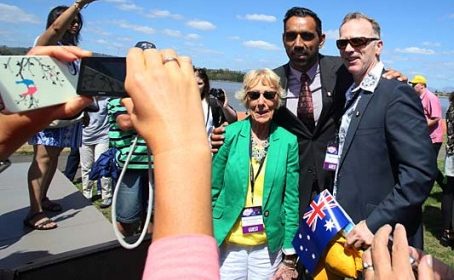ANDREW WEBSTER
January 27, 2014

The most ill-advised argument anyone could make right now is that Adam Goodes was named Australian of the Year for calling out a 13-year-old girl at the MCG in between chasing a piece of inflated red leather around a footy oval.
The most ill-advised question anyone could ask is what has the Swans footballer done compared with those who have served and lost lives in Afghanistan, or produced miracles in operating theatres?
It’s what Goodes can do over the next year that makes his appointment one of the most inspired choices in years.
When it was revealed on Saturday night that the 34-year-old had received the honour, it was overwhelmingly applauded yet also caused a predictable ripple of discontent. That ripple wasn’t so much laced with racist undertones as with questions about whether Goodes was a worthy recipient.
After all, he is just – gulp! – a footballer. Moaning about the worthiness of the Australian of the Year winner is the equivalent of shooting fish in a barrel for your standard Australian whinger. They’re the same people who complain about the heat in summer, sand at the beach, the traffic during school holidays, and how bad Seven’s coverage is of the tennis.
Goodes is the first sportsperson to win the award since former Australian Test captain Steve Waugh in 2004, and before that the likes of Pat Rafter (2002), Mark Taylor (1999) and Cathy Freeman (1998).
Some will point out that sportspeople often won during the tenure of Australia’s little Wallabies tracksuit-wearing prime minister and sports tragic John Howard, but let’s just assume it was a coincidence.
With all due respect to those indigenous sports people who have gone before him – including Lionel Rose (1968) and Evonne Goolagong (1971) – Goodes’ influence can be immense. A footballer, yes, but so much more than that.
On May 24 last year, Goodes was pictured standing in the middle of the SCG at sunset, lifting his Swans jumper, pointing to his dark skin and dipping his lid to another indigenous hero, St Kilda’s Nicky Winmar, who 20 years earlier had lifted his shirt to say, “I’m black and I’m proud”.
“That’s exactly what the photo symbolises to me,” Goodes said of Winmar’s remarks. ”Even today, 20 years later, it highlights how every indigenous person should feel about their heritage.”
Imagine, then, the grief Goodes must have felt when he was standing near the boundary line at the MCG later that night when a 13-year-old Collingwood fan called him an “ape”.
“People don’t understand how one word can cut me so deep,” Goodes says in a video on the Australian of the Year website, before later adding: ‘”I haven’t always been a confident, young man. I was shy growing up. I learnt about standing up for what you believe in.” Now, there’s standing up for what you believe in, and there’s standing up in front of tens of thousands of people at the MCG and watching on TV at home.
But it isn’t about that moment that makes Goodes a hero.
It is about the next day, when he took a call from a distressed teenage girl, and then asked via social media for the community to support her.
It is about how he handled Pies president Eddie McGuire a few days later after he joked on radio that Goodes would make a good promoter for the King Kong stage production.
It is about the way Goodes has used his own ugly, heartbreaking experience and turned it into the best possible tool to wipe out the stain of racism that is still there, even now.
It is about the GO Foundation he formed in 2009 with cousin and former Swans teammate Michael O’Loughlin to provide scholarships for indigenous students.
It is about the past year when he has been at the forefront of raising awareness of the issue of domestic violence.
Adam Gilchrist, former Test cricket wicketkeeper and Australia Day Council chairman, said last week: ”People might debate if we made the right choice, but they can never say we made the wrong choice.”
Goodes will further a debate this country has been having since Australia Day, 1788, with so much more to go, and surely that makes him the right one.
